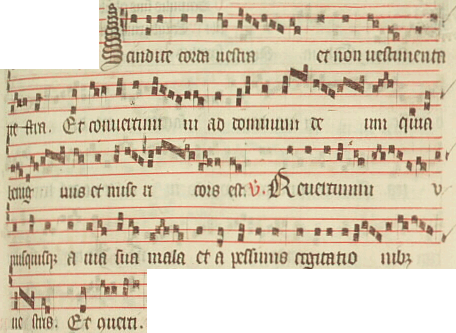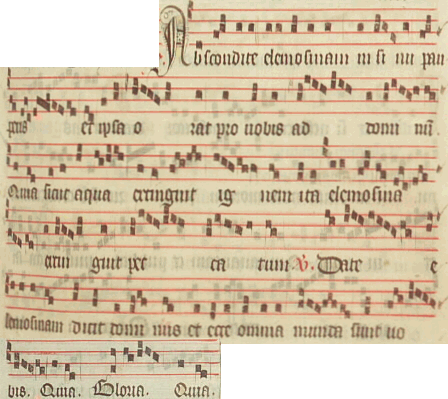READINGS: LENT WEDNESDAY I
שׁוּבוּ
וְהָשִׁיבוּ
מִכָּל־פִּשְׁעֵיכֶם —
וַעֲשׂוּ לָכֶם לֵב
חָדָשׁ וְרוּחַ חֲדָשָׁה Even Years: Exodus 10:21—11:10
וַיֹּאמֶר
יְהוָה
אֶל־מֹשֶׁה
נְטֵה יָדְךָ
עַל־הַשָּׁמַיִם
וִיהִי
חֹשֶׁךְ
עַל־אֶרֶץ
מִצְרָיִם
וְיָמֵשׁ
חֹשֶׁךְ׃ וַיֵּט
מֹשֶׁה
אֶת־יָדוֹ
עַל־הַשָּׁמָיִם
וַיְהִי
חֹשֶׁךְ־אֲפֵלָה
בְּכָל־אֶרֶץ
מִצְרַיִם
שְׁלֹשֶׁת
יָמִים׃
לֹא־רָאוּ
אִישׁ
אֶת־אָחִיו
וְלֹא־קָמוּ
אִישׁ
מִתַּחְתָּיו
שְׁלֹשֶׁת
יָמִים וּלְכָל־בְּנֵי
יִשְׂרָאֵל
הָיָה אוֹר
בְּמוֹשְׁבֹתָם׃
וַיִּקְרָא
פַרְעֹה
אֶל־מֹשֶׁה
וַיֹּאמֶר
לְכוּ
עִבְדוּ
אֶת־יְהוָה
רַק צֹאנְכֶם
וּבְקַרְכֶם
יֻצָּג
גַּם־טַפְּכֶם
יֵלֵךְ
עִמָּכֶם׃ וַיֹּאמֶר
מֹשֶׁה
גַּם־אַתָּה
תִּתֵּן בְּיָדֵנוּ
זְבָחִים
וְעֹלוֹת
וְעָשִׂינוּ
לַיהוָה
אֱלֹהֵינוּ׃ וְגַם־מִקְנֵנוּ
יֵלֵךְ
עִמָּנוּ לֹא
תִשָּׁאֵר
פַּרְסָה
כִּי
מִמֶּנּוּ
נִקַּח לַעֲבֹד
אֶת־יְהוָה
אֱלֹהֵינוּ
וַאֲנַחְנוּ
לֹא־נֵדַע
מַה־נַּעֲבֹד
אֶת־יְהוָה
עַד־בֹּאֵנוּ
שָׁמָּה׃
וַיְחַזֵּק
יְהוָה
אֶת־לֵב
פַּרְעֹה
וְלֹא אָבָה
לְשַׁלְּחָם׃ וַיֹּאמֶר־לוֹ
פַרְעֹה לֵךְ
מֵעָלָי
הִשָּׁמֶר
לְךָ
אֶל־תֹּסֶף
רְאוֹת
פָּנַי כִּי בְּיוֹם
רְאֹתְךָ
פָנַי
תָּמוּת׃ וַיֹּאמֶר
מֹשֶׁה כֵּן
דִּבַּרְתָּ
לֹא־אֹסִף
עוֹד רְאוֹת
פָּנֶיךָ׃
וַיֹּאמֶר
יְהוָה
אֶל־מֹשֶׁה
עוֹד נֶגַע אֶחָד
אָבִיא
עַל־פַּרְעֹה
וְעַל־מִצְרַיִם
אַחֲרֵי־כֵן
יְשַׁלַּח
אֶתְכֶם
מִזֶּה כְּשַׁלְּחוֹ
כָּלָה
גָּרֵשׁ
יְגָרֵשׁ אֶתְכֶם
מִזֶּה׃ דַּבֶּר־נָא
בְּאָזְנֵי
הָעָם
וְיִשְׁאֲלוּ
אִישׁ מֵאֵת
רֵעֵהוּ
וְאִשָּׁה
מֵאֵת רְעוּתָהּ
כְּלֵי־כֶסֶף
וּכְלֵי
זָהָב׃ וַיִּתֵּן
יְהוָה
אֶת־חֵן
הָעָם
בְּעֵינֵי מִצְרָיִם
גַּם הָאִישׁ
מֹשֶׁה
גָּדוֹל מְאֹד
בְּאֶרֶץ
מִצְרַיִם
בְּעֵינֵי
עַבְדֵי־פַרְעֹה
וּבְעֵינֵי
הָעָם׃
וַיֹּאמֶר
מֹשֶׁה כֹּה
אָמַר יְהוָה
כַּחֲצֹת
הַלַּיְלָה
אֲנִי יוֹצֵא
בְּתוֹךְ מִצְרָיִם׃ וּמֵת
כָּל־בְּכוֹר
בְּאֶרֶץ
מִצְרַיִם מִבְּכוֹר
פַּרְעֹה
הַיֹּשֵׁב
עַל־כִּסְאוֹ
עַד בְּכוֹר
הַשִּׁפְחָה
אֲשֶׁר אַחַר
הָרֵחָיִם
וְכֹל
בְּכוֹר בְּהֵמָה׃ וְהָיְתָה
צְעָקָה
גְדֹלָה
בְּכָל־אֶרֶץ
מִצְרָיִם
אֲשֶׁר
כָּמֹהוּ לֹא
נִהְיָתָה וְכָמֹהוּ
לֹא תֹסִף׃ וּלְכֹל
בְּנֵי
יִשְׂרָאֵל
לֹא
יֶחֱרַץ־כֶּלֶב
לְשֹׁנוֹ
לְמֵאִישׁ
וְעַד־בְּהֵמָה
לְמַעַן
תֵּדְעוּן
אֲשֶׁר
יַפְלֶה
יְהוָה בֵּין
מִצְרַיִם
וּבֵין יִשְׂרָאֵל׃ וְיָרְדוּ
כָל־עֲבָדֶיךָ
אֵלֶּה אֵלַי
וְהִשְׁתַּחֲוּוּ־לִי
לֵאמֹר צֵא
אַתָּה וְכָל־הָעָם
אֲשֶׁר־בְּרַגְלֶיךָ
וְאַחֲרֵי־כֵן
אֵצֵא
וַיֵּצֵא
מֵעִם־פַּרְעֹה
בָּחֳרִי־אָף׃
וַיֹּאמֶר
יְהוָה
אֶל־מֹשֶׁה
לֹא־יִשְׁמַע
אֲלֵיכֶם
פַּרְעֹה
לְמַעַן
רְבוֹת
מוֹפְתַי
בְּאֶרֶץ
מִצְרָיִם׃ וּמֹשֶׁה
וְאַהֲרֹן
עָשׂוּ
אֶת־כָּל־הַמֹּפְתִים
הָאֵלֶּה
לִפְנֵי
פַרְעֹה
וַיְחַזֵּק
יְהוָה
אֶת־לֵב
פַּרְעֹה
וְלֹא־שִׁלַּח
אֶת־בְּנֵי־יִשְׂרָאֵל
מֵאַרְצוֹ׃
24 Pharaoh summoned Moses and said, 'Go and worship Yahweh, but your flocks and herds are to stay here. Your wives and children can go with you too.' 25 Moses said, 'But now you must give us sacrifices and burnt offerings to offer to Yahweh our God. 26 And our livestock will go with us too; not a hoof will be left behind; for we may need animals from these to worship Yahweh our God; for until we get there we ourselves cannot tell how we are to worship Yahweh.'
27 But Yahweh made Pharaoh stubborn, and he refused to let them go. 28 Pharaoh said to Moses, 'Out of my sight! Be sure you never see my face again, for the next time you see my face you die!' 29 Moses then said, 'You yourself have said it. I shall never see your face again.'
11:1 Yahweh then said to Moses, 'I shall inflict one more plague on Pharaoh and Egypt, after which he will let you go away. When he lets you go, he will actually drive you out! 2 Now instruct the people that every man is to ask his neighbour, and every woman hers, for silver and golden jewellery.' 3 And Yahweh made the Egyptians impressed with the people, while Moses himself was a man of great importance in Egypt in the opinion of Pharaoh's officials and the people.
4 Moses then said, 'Yahweh says this, "At midnight I shall pass through Egypt, 5 and all the first-born in Egypt will die, from the first-born of Pharaoh, heir to his throne, to the first-born of the slave-girl at the mill, and all the first-born of the livestock. 6 And throughout Egypt there will be great wailing, such as never was before, nor will be again. 7 But against the Israelites, whether man or beast, never a dog shall bark, so that you may know that Yahweh discriminates between Egypt and Israel. 8 Then all these officials of yours will come down to me and, bowing low before me, say: Go away, you and all the people who follow you! After which, I shall go." ' And, hot with anger, he left Pharaoh's presence.
9 Yahweh then said to Moses, 'Pharaoh will not listen to you, so that more of my wonders may be displayed in Egypt.' 10 Moses and Aaron worked all these wonders in Pharaoh's presence, but Yahweh made Pharaoh stubborn, and he did not let the Israelites leave his country.
Odd Years: Deuteronomy 10:12—11:9,26-28
12 וְעַתָּה
יִשְׂרָאֵל
מָה יְהוָה
אֱלֹהֶיךָ
שֹׁאֵל
מֵעִמָּךְ
כִּי
אִם־לְיִרְאָה
אֶת־יְהוָה
אֱלֹהֶיךָ
לָלֶכֶת
בְּכָל־דְּרָכָיו
וּלְאַהֲבָה
אֹתוֹ
וְלַעֲבֹד
אֶת־יְהוָה
אֱלֹהֶיךָ
בְּכָל־לְבָבְךָ
וּבְכָל־נַפְשֶׁךָ׃
14 Look, to Yahweh your God belong heaven and the heaven of heavens, the earth and everything on it; 15 yet it was on your ancestors, for love of them, that Yahweh set his heart to love them, and he chose their descendants after them, you yourselves, out of all nations, up to the present day. 16 Circumcise your heart then and be obstinate no longer; 17 for Yahweh your God is God of gods and Lord of lords, the great God, triumphant and terrible, free of favouritism, never to be bribed. 18 He it is who sees justice done for the orphan and the widow, who loves the stranger and gives him food and clothing. 19 (Love the stranger then, for you were once strangers in Egypt.)
20 Yahweh your God is the one whom you must fear and serve; to him you must hold firm; in his name take your oaths. 21 Him you must praise, he is your God: for you he has done these great and terrible things which you have seen for yourselves; 22 and, although your ancestors numbered only seventy persons when they went down to Egypt, Yahweh your God has now made you as many as the stars of heaven.
11:1 You must love Yahweh your God and always keep his observances, his laws, his customs, his commandments.
2 You are the ones who have had the experience, not your children. They have not had the experience, they have not witnessed the lessons of Yahweh your God, his greatness, his mighty hand and his outstretched arm, 3 the signs and the deeds which he performed in the heart of Egypt, against Pharaoh king of Egypt and his entire country, 4 what he did to the armies of Egypt, to their horses and their chariots, by overwhelming them with the waters of the Sea of Reeds when they were pursuing you, and leaving no trace of them to this day; 5 what he did for you in the desert, until you arrived here; 6 what he did to Dathan and Abiram the sons of Eliab the Reubenite, when, with all Israel standing round, the earth opened its mouth and swallowed them, with their families, their tents and all their supporters. 7 All these great deeds of Yahweh you have seen with your own eyes.
8 You must keep all the commandments which I enjoin on you today, so that you may have the strength to conquer the country into which you are about to cross, to take possession of it, 9 and so that you may live long in the country which Yahweh promised on oath to bestow on your ancestors and their descendants, a country flowing with milk and honey...
25 No one will be able to resist you; Yahweh your God will make you feared and dreaded throughout the territory you tread, as he has promised you.
26 Today, look, I am offering you a blessing and a curse: 27 a blessing, if you obey the commandments of Yahweh your God which I enjoin on you today; 28 a curse, if you disobey the commandments of Yahweh your God and leave the way which today I have marked out for you, by following other gods hitherto unknown to you.
Even Years: Bishop Aphraates, Demonstration 11 on the Circumcision, 11-12 (PS 1, 498-503)
Odd Years: Diadocos of Photiki, Chapters on perfection, 12,13,14 (PG 65, 1171-1172)

Invitatory Psalm & BACK
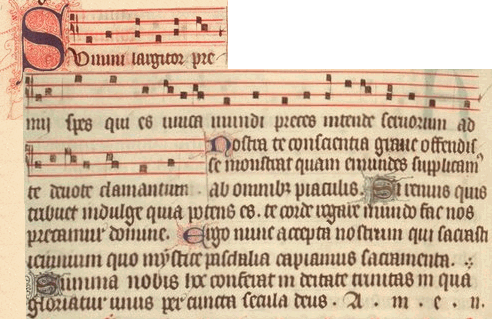
PSALMS and BACK
21 Yahweh then said to Moses, 'Stretch out your hand towards heaven, and let darkness, darkness so thick that it can be felt, cover Egypt.' 22 So Moses stretched out his hand towards heaven, and for three days there was thick darkness over the whole of Egypt. 23 No one could see anyone else or move about for three days, but all the Israelites did have light where they were living.
13 לִשְׁמֹר
אֶת־מִצְוֹת
יְהוָה
וְאֶת־חֻקֹּתָיו
אֲשֶׁר
אָנֹכִי
מְצַוְּךָ
הַיּוֹם לְטוֹב
לָךְ׃
14 הֵן
לַיהוָה
אֱלֹהֶיךָ
הַשָּׁמַיִם
וּשְׁמֵי
הַשָּׁמָיִם
הָאָרֶץ
וְכָל־אֲשֶׁר־בָּהּ׃
15 רַק
בַּאֲבֹתֶיךָ
חָשַׁק
יְהוָה
לְאַהֲבָה
אוֹתָם
וַיִּבְחַר
בְּזַרְעָם
אַחֲרֵיהֶם
בָּכֶם
מִכָּל־הָעַמִּים
כַּיּוֹם
הַזֶּה׃
16 וּמַלְתֶּם
אֵת עָרְלַת
לְבַבְכֶם
וְעָרְפְּכֶם
לֹא תַקְשׁוּ
עוֹד׃
17 כִּי
יְהוָה
אֱלֹהֵיכֶם
הוּא אֱלֹהֵי
הָאֱלֹהִים
וַאֲדֹנֵי
הָאֲדֹנִים
הָאֵל הַגָּדֹל
הַגִּבֹּר
וְהַנּוֹרָא
אֲשֶׁר
לֹא־יִשָּׂא
פָנִים וְלֹא
יִקַּח
שֹׁחַד׃
18 עֹשֶׂה
מִשְׁפַּט
יָתוֹם
וְאַלְמָנָה
וְאֹהֵב גֵּר
לָתֶת לוֹ
לֶחֶם
וְשִׂמְלָה׃
19 וַאֲהַבְתֶּם
אֶת־הַגֵּר
כִּי־גֵרִים
הֱיִיתֶם
בְּאֶרֶץ
מִצְרָיִם׃
20 אֶת־יְהוָה
אֱלֹהֶיךָ
תִּירָא
אֹתוֹ תַעֲבֹד
וּבוֹ
תִדְבָּק
וּבִשְׁמוֹ
תִּשָּׁבֵעַ׃
21 הוּא
תְהִלָּתְךָ
וְהוּא
אֱלֹהֶיךָ
אֲשֶׁר־עָשָׂה
אִתְּךָ
אֶת־הַגְּדֹלֹת
וְאֶת־הַנּוֹרָאֹת
הָאֵלֶּה
אֲשֶׁר רָאוּ
עֵינֶיךָ׃
22 בְּשִׁבְעִים
נֶפֶשׁ
יָרְדוּ
אֲבֹתֶיךָ מִצְרָיְמָה
וְעַתָּה
שָׂמְךָ
יְהוָה אֱלֹהֶיךָ
כְּכוֹכְבֵי
הַשָּׁמַיִם
לָרֹב׃
11: 1 וְאָהַבְתָּ
אֵת יְהוָה
אֱלֹהֶיךָ
וְשָׁמַרְתָּ
מִשְׁמַרְתּוֹ
וְחֻקֹּתָיו
וּמִשְׁפָּטָיו
וּמִצְוֹתָיו
כָּל־הַיָּמִים׃
2 וִידַעְתֶּם
הַיּוֹם כִּי
לֹא
אֶת־בְּנֵיכֶם
אֲשֶׁר
לֹא־יָדְעוּ
וַאֲשֶׁר
לֹא־רָאוּ
אֶת־מוּסַר
יְהוָה
אֱלֹהֵיכֶם
אֶת־גָּדְלוֹ
אֶת־יָדוֹ
הַחֲזָקָה
וּזְרֹעוֹ
הַנְּטוּיָה׃
3 וְאֶת־אֹתֹתָיו
וְאֶת־מַעֲשָׂיו
אֲשֶׁר עָשָׂה
בְּתוֹךְ
מִצְרָיִם
לְפַרְעֹה
מֶלֶךְ־מִצְרַיִם
וּלְכָל־אַרְצוֹ׃
4 וַאֲשֶׁר
עָשָׂה
לְחֵיל
מִצְרַיִם
לְסוּסָיו
וּלְרִכְבּוֹ
אֲשֶׁר
הֵצִיף
אֶת־מֵי יַם־סוּף
עַל־פְּנֵיהֶם
בְּרָדְפָם
אַחֲרֵיכֶם
וַיְאַבְּדֵם
יְהוָה עַד
הַיּוֹם הַזֶּה׃
5 וַאֲשֶׁר
עָשָׂה לָכֶם
בַּמִּדְבָּר
עַד־בֹּאֲכֶם
עַד־הַמָּקוֹם
הַזֶּה׃
6 וַאֲשֶׁר
עָשָׂה
לְדָתָן
וְלַאֲבִירָם
בְּנֵי
אֱלִיאָב
בֶּן־רְאוּבֵן
אֲשֶׁר פָּצְתָה
הָאָרֶץ
אֶת־פִּיהָ
וַתִּבְלָעֵם
וְאֶת־בָּתֵּיהֶם
וְאֶת־אָהֳלֵיהֶם
וְאֵת
כָּל־הַיְקוּם
אֲשֶׁר בְּרַגְלֵיהֶם
בְּקֶרֶב
כָּל־יִשְׂרָאֵל׃
7 כִּי
עֵינֵיכֶם
הָרֹאֹת
אֶת־כָּל־מַעֲשֵׂה
יְהוָה
הַגָּדֹל
אֲשֶׁר
עָשָׂה׃
8 וּשְׁמַרְתֶּם
אֶת־כָּל־הַמִּצְוָה
אֲשֶׁר
אָנֹכִי
מְצַוְּךָ
הַיּוֹם
לְמַעַן תֶּחֶזְקוּ
וּבָאתֶם
וִירִשְׁתֶּם
אֶת־הָאָרֶץ
אֲשֶׁר
אַתֶּם
עֹבְרִים
שָׁמָּה
לְרִשְׁתָּהּ׃
9 וּלְמַעַן
תַּאֲרִיכוּ
יָמִים
עַל־הָאֲדָמָה
אֲשֶׁר
נִשְׁבַּע
יְהוָה
לַאֲבֹתֵיכֶם
לָתֵת לָהֶם
וּלְזַרְעָם
אֶרֶץ זָבַת
חָלָב
וּדְבָשׁ׃...
26 רְאֵה
אָנֹכִי
נֹתֵן
לִפְנֵיכֶם
הַיּוֹם בְּרָכָה
וּקְלָלָה׃
27 אֶת־הַבְּרָכָה
אֲשֶׁר
תִּשְׁמְעוּ
אֶל־מִצְוֹת
יְהוָה
אֱלֹהֵיכֶם
אֲשֶׁר
אָנֹכִי
מְצַוֶּה
אֶתְכֶם
הַיּוֹם׃
28 וְהַקְּלָלָה
אִם־לֹא
תִשְׁמְעוּ אֶל־מִצְוֹת
יְהוָה
אֱלֹהֵיכֶם
וְסַרְתֶּם
מִן־הַדֶּרֶךְ
אֲשֶׁר
אָנֹכִי
מְצַוֶּה אֶתְכֶם
הַיּוֹם
לָלֶכֶת
אַחֲרֵי
אֱלֹהִים
אֲחֵרִים
אֲשֶׁר
לֹא־יְדַעְתֶּם׃
12 And now, Israel, what does Yahweh your God ask of you? Only this: to fear Yahweh your God, to follow all his ways, to love him, to serve Yahweh your God with all your heart and all your soul, 13 to keep the commandments and laws of Yahweh, which I am laying down for you today for your own good.
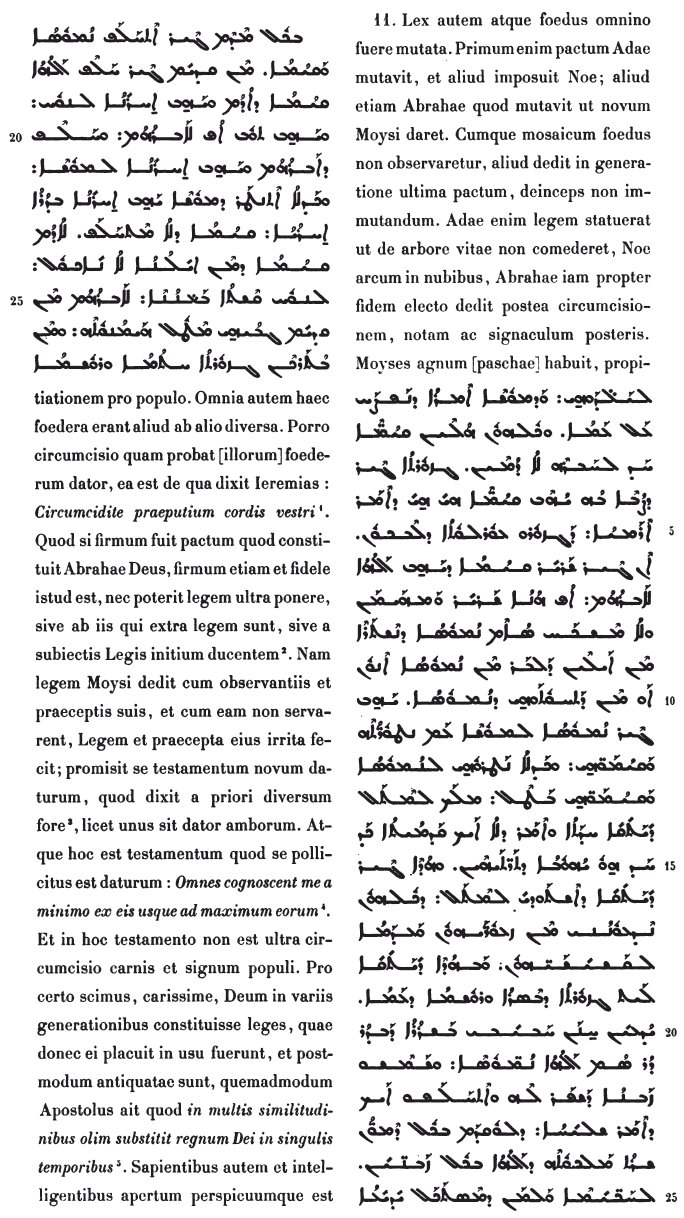
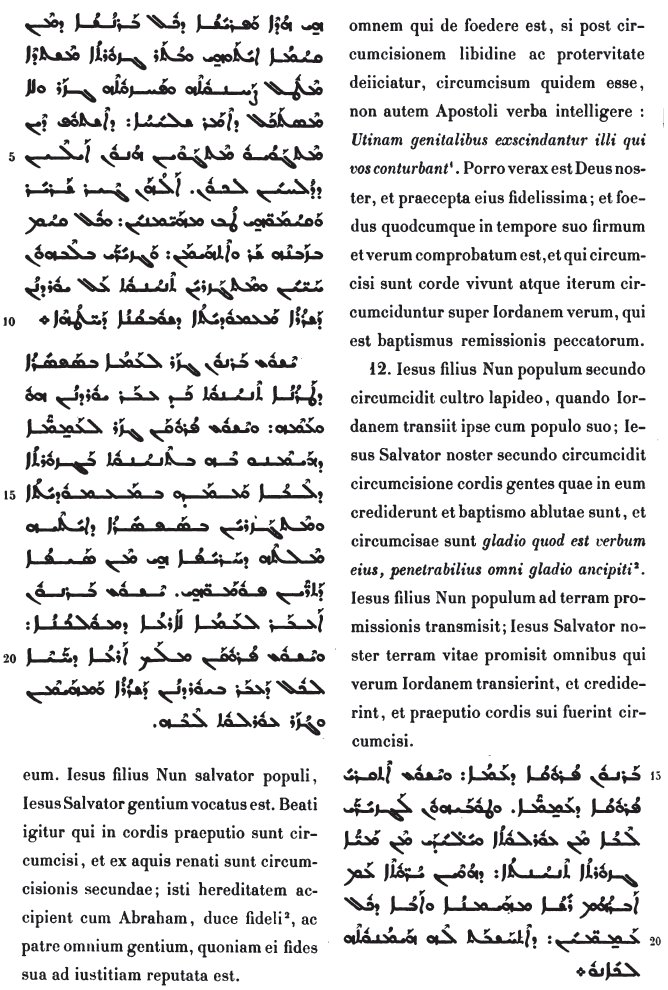
Law and covenant have been entirely changed. God changed the first pact with Adam, and gave a new one to Noah. He gave another to Abraham, and changed this to give a new one to Moses. When the covenant with Moses was no longer observed, he gave another pact in this last age, a pact never again to be changed.
He established a new law for Adam, that he could not eat of the tree of life. He gave to Noah the sign of the rainbow in the clouds. He then gave Abraham, chosen for his faith, the mark and seal of circumcision for his descendants. Moses was given the Passover lamb, the propitiation for the people.
All these covenants were different from each other. Moreover, the circumcision that is approved by the giver of those covenants is the kind of spoken of by Jeremiah: Circumcise your hearts. If Gods pact with Abraham was firm, so also is this covenant firm and trustworthy, nor can any other law be laid down, whether it originates outside the law or among those subject to the law.
God gave Moses a law together with his prescriptions and precepts, and when it was no longer kept, he made the law and its precepts of no avail. He promised a new covenant, different from the first, though the giver of both is one and the same. This is the covenant that he promised: All shall know me from the least to the greatest. In this covenant there is no longer any circumcision of the flesh, any seal upon the people.
We know, dearly beloved, that God established different laws in different generations which were in force as long as it pleased him. Afterward they were made obsolete. In the words of the apostle: In former times the kingdom of God existed in each generation under different signs.
Moreover, our God is truthful and his commandments are most trustworthy. Every covenant was proved firm and trustworthy in its own time, and those who have been circumcised in heart are brought to life and receive a second circumcision beside the true Jordan, the waters of baptism that bring forgiveness of sins.
Jesus, son of Nun, renewed the peoples circumcision with a knife of stone when he had crossed the Jordan with the Israelites. Jesus, our Saviour, renews the circumcision of the heart for the nations who have believed in him and are washed by baptism: circumcision by the sword of his word, sharper than any two-edged sword.
Jesus, son of Nun, led the people across the Jordan into the promised land. Jesus, our Savior, has promised the land of the living to all who have crossed the true Jordan, and have believed and are circumcised in heart.
Blessed, then, are those who are circumcised in heart, and have been reborn in water through the second circumcision. They will receive their inheritance with Abraham, the faithful leader and father of all nations, for his faith was credited to him for righteousness.
Ὁ ἑαυτὸν
φιλῶν τὸν θεὸν ἀγαπᾶν
οὐ δύναται ὁ δὲ
ἑαυτὸν μὴ φιλῶν
ἕνεκεν τοῦ ὑπερβάλλοντος
πλούτου τῆς ἀγάπης
τοῦ θεοῦ, οὗτος
τὸν θεὸν ἀγαπᾷ.
Διόπερ οὐ τὴν ἑαυτοῦ
ὁ τοιοῦτος
ζητεῖ δόξαν
ποτέ, ἀλλὰ τὴν
τοῦ θεοῦ ὁ γὰρ ἑαυτὸν
φιλῶν τὴν ἑαυτοῦ
δόξαν ζητεῖ. Ὁ δὲ
τὸν θεὸν φιλῶν
τὴν τοῦ
ποιήσαντος αὐτὸν
δόξαν ἀγαπᾷ
He who loves himself is not able to love God. He who does not love himself on account of the surpassing wealth of the love of God, this one loves God. Wherefore such a person does not ever seek his own glory but the glory of God, for he who loves himself seeks his own glory. He who loves God loves the glory of him who made him.
ψυχῆς
γὰρ αἰσθητικῆς
καὶ θεοφιλοῦς ἴδιον
τὴν μὲν δόξαν ἀεὶ
ζητεῖν τοῦ θεοῦ
ἐν πάσαις αἷς
ποιεῖ ἐντολαῖς,
ἐπὶ δὲ τῇ ἑαυτῆς
ταπεινώσει τέρπεσθαι,
ὅτι τῷ θεῷ μὲν
δόξα διὰ
μεγαλωσύνην
πρέπει, ἀνθρώπῳ
δὲ ταπείνωσις, ἵνα
δι αὐτῆς οἰκειωθῶμεν
θεῷ. Ὅπερ ἐὰν
ποιῶμεν, καὶ ἡμεῖς
κατὰ τὸν ἅγιον
βαπτιστὴν Ἰωάννην
χαίροντες τῇ
δόξῃ τοῦ
κυρίου ἀπαύστως
λέγειν ἀρξόμεθα
Ἐκεῖνον δεῖ ὑψοῦσθαι,
ἡμᾶς δὲ ἐλαττοῦσθαι.
The characteristic of the soul which has the spiritual sense and which loves God is ever to seek the glory of God in all the commandments that it fulfils but to delight in its own humility, because glory for the sake of grandeur is proper to God whereas humility is proper to man, so that through it we become intimate with God. If we do this very thing, then rejoicing unceasingly in the glory of the Lord we too will begin to say according to St John the Baptist: He must be raised up but we must be decreased.
Οἶδα ἐγώ
τινα τοσοῦτον
τὸν θεὸν ἀγαπῶντα
καὶ ἔτι πενθοῦντα
ὅτι οὐ καθὼς
θέλει ἀγαπᾷ, ὥστε
ἀπαύστως αὐτοῦ
τὴν ψυχὴν ἐν
τοιαύτῃ εἶναί
τινι θερμῇ ἐπιθυμίᾳ
ὥστε τὸν μὲν θεὸν
ἐν αὐτῷ
δοξάζεσθαι, ἑαυτὸν
δὲ ὡς μηδὲ ὄντα
εἶναι. Οὗτος δὲ
οὐδὲ οἶδεν ὅπερ
ἐστὶν οὐδὲ ἐν
αὐτοῖς τοῖς ἐπαίνοις
τῶν λόγων τῇ γὰρ
πολλῇ ἐπιθυμίᾳ
τῆς
ταπεινώσεως τὴν
ἑαυτοῦ οὐκ ἐννοεῖ
ἀξίαν, ἀλλὰ
λειτουργεῖ μὲν
θεῷ ὡς νόμος ἱερεῦσιν,
πολλῇ δέ τινι τῇ
τῆς φιλοθείας
διαθέσει
κλέπτει ἑαυτοῦ
τὴν μνήμην τῆς ἀξίας
ἐν τῷ βάθει που
τῆς ἀγάπης τοῦ
θεοῦ τὸ ἐκ
ταύτης ἐναποκρύπτων
καύχημα ἐν
πνεύματι
ταπεινώσεως, ἵνα
παῖς τις ἀχρεῖος
παρ ἑαυτῷ διὰ
παντὸς τῇ
διανοίᾳ
φαίνηται, ὡς ἀλλότριος
ὢν τῆς ἑαυτοῦ ἀξίας
τῇ ἐπιθυμίᾳ τῆς
ταπεινώσεως. Ὅπερ
δεῖ καὶ ἡμᾶς
ποιοῦντας πᾶσαν
τιμὴν ἀποφεύγειν
καὶ δόξαν διὰ τὸ
ὑπερβάλλον τοῦ
πλούτου τῆς ἀγάπης
τοῦ οὕτως ἡμᾶς ἀγαπήσαντος
κυρίου.
I know someone who loves God so much, and who still mourns that he does not love as he wishes, that unceasingly his soul is in a certain sort of warm desire that God be glorified in him and his own self be as not existing. This man does not know just what he is, not even in the midst of the very praises borne by words. In a great desire for humility he does not conceive his own rank; but on the one hand he serves God according to the law for priests and on the other hand in a certain great disposition of love for God he steals the memory of his rank, in a spirit of humility concealing the boast that comes from this rank somewhere in the depth of the love of God so that in his intellect he always appear to himself some unworthy servant, as being estranged from his own rank in the desire for humility. And doing this very same thing we must avoid every honour and glory for the sake of the excess of wealth of the love of the Lord who loves us thus.
Ὁ ἐν αἰσθήσει
καρδίας ἀγαπῶν
τὸν θεὸν ἐκεῖνος
ἔγνωσται ὑπ αὐτοῦ
ὅσον γάρ τις ἐν
αἰσθήσει τῆς
ψυχῆς
παραδέχεται τὴν
ἀγάπην τοῦ θεοῦ,
τοσοῦτον
γίνεται ἐν τῇ ἀγάπῃ
τοῦ θεοῦ. Διὸ
λοιπὸν τοῦ
φωτισμοῦ τῆς
γνώσεως ἐν ἔρωτί
τινι σφοδρῷ ὁ
τοιοῦτος ὀρεγόμενος
οὐ παύσεται, ἄχρις
ἂν αὐτῆς τῆς τῶν
ὀστέων αἰσθήσεως
αἴσθηται, οὐκέτι
εἰδὼς ἑαυτόν, ἀλλ
ὅλος ὑπὸ τῆς ἀγάπης
ἠλλοιωμένος
τοῦ θεοῦ.
He who loves God in [spiritual] perception of heart has been known by him. For as much as someone accepts the love of God in [spiritual] perception of heart, that much he comes to be in the love of God. Therefore, henceforth such a person will not cease reaching out for the illumination of gnosis in a certain intense Eros until he might perceive the very [spiritual] sense of his bones, no longer knowing himself but wholly transformed by the love of God.
Ὁ τοιοῦτος
δὲ καὶ πάρεστιν
ἐν τῷ βίῳ καὶ οὐ
πάρεστιν ἔτι γὰρ
ἐνδημῶν τῷ ἑαυτοῦ
σώματι ἐκδημεῖ
διὰ τῆς ἀγάπης
τῇ κινήσει τῆς
ψυχῆς ἀπαύστως
πρὸς τὸν θεόν. Ἀνενδότως
γὰρ λοιπὸν διὰ
τοῦ πυρὸς τῆς ἀγάπης
τὴν καρδίαν καιόμενος
ἀνάγκῃ τινὶ
πόθου
κεκόλληται τῷ
θεῷ, ὡς ἐκστὰς ἅπαξ
τῆς ἑαυτοῦ
φιλίας τῇ ἀγάπῃ
τοῦ θεοῦ. Εἴτε γὰρ
ἐξέστημεν,
φησίν, θεῷ, εἴτε
σωφρονοῦμεν, ὑμῖν.
Such a person is both present in this life and not present; still sojourning in his body, in the movement of the soul he departs unceasingly towards God by means of love. For he has henceforth adhered to God unwaveringly, burning the heart by means of the fire of love in a certain necessity of desire, once and for all having stood outside of friendship for himself in the love of God. For it says: Whether we are beside ourselves, for God; whether we are of sound mind, for you. [tr. Timios Prodromos]
Prayer
